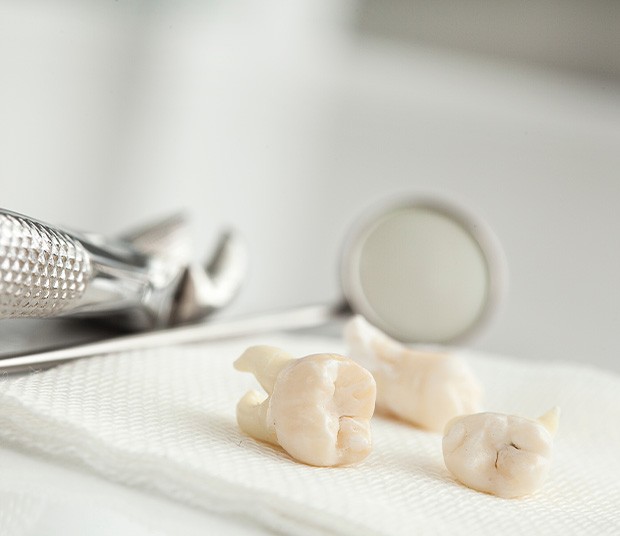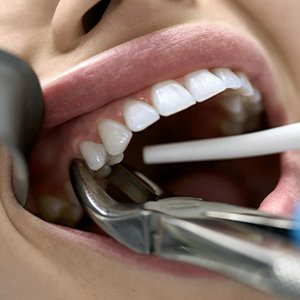Dentures – Dallas, TX
Give Yourself Your Smile Back!
When you’re missing teeth, things you once found easy can be made more challenging. This includes chewing your food, speaking clearly, or even smiling without feeling embarrassed. Fortunately, you don’t need to go the rest of your life with gaps in your smile. We offer customized dentures to restore the appearance and function of your smile. To learn more about dentures or to find out if they are the right tooth replacement option for you, give us a call to schedule your consultation.
Why Choose Spillman Family Dentistry for Dentures?
- Customized for Optimal Comfort and Appearance
- Dental Insurance & Medicaid Welcomed
- Saturday Appointments Available
Who’s a Good Candidate for Dentures?

If you’ve been struggling with the effects of tooth loss, dentures may be the solution for you. They are able to help people with missing teeth enjoy balanced diets, enunciate their words, and smile without worrying about their appearance. During your consultation with us, we will discuss your individual situation to determine if dentures are the right solution for you. In the meantime, here are some things for you to take into consideration.
Effects of Missing Teeth
The teeth are very strong. Tooth enamel is the strongest substance in the entire body – even stronger than bone! That being said, teeth aren’t completely indestructible. They can be lost for a variety of different reasons, including tooth decay, gum disease, and trauma to the mouth. According to the American Academy of Periodontology, there are numerous negative effects of tooth loss, including facial sagging, difficulty speaking, trouble eating, and lower self-confidence. When you replace your missing teeth with dentures, you can improve all of these things, therefore improving your overall quality of life!
What Qualifies You for Dentures?
Dentures are ideal for people who are missing multiple, most of, or all of their teeth. Depending on the number of teeth you are missing and where they are located in your mouth, we can create a customized treatment plan and restoration for you. If you are currently dealing with gum disease, tooth decay, or another oral health issue, we will need to address that before we can move forward in the process of getting dentures.
Alternative Tooth-Replacement
If dentures don’t sound like something you are interested in, or they don’t meet the needs you have for your smile, you may want to consider an alternative tooth replacement option, like a dental bridge. A dental bridge works by “bridging” the gap where one or more consecutive teeth are missing. A bridge consists of two dental crowns that are placed over the adjacent teeth and a number of “pontics,” or replacement teeth. Depending on the number of teeth you are missing, and where they are located in the mouth, a dental bridge may be an ideal option for you.
Types of Dentures

There are a few different types of dentures out there to cater to a variety of needs. After we examine your smile, we’ll be able to tell you which of the following is a good option for you.
Partial Dentures
Partial dentures are great for patients who still have some healthy teeth in their mouth. This restoration fits between those teeth like a puzzle piece. This way, missing teeth in different areas of the mouth can be replaced with a single restoration for each affected arch.
Full Dentures
If you are missing all of the teeth on one or both arches, a full denture is likely the best option for you. Instead of being held in by clasps and existing teeth, full dentures are kept stationary by the shape and suction of the gums.
Implant Dentures
For patients who are hoping for a sturdier, longer-lasting tooth replacement option, implant dentures can help. This type of denture is anchored into the jawbone with titanium, screw-like dental implants that are surgically placed to act as tooth roots. They allow for additional bite force and prevent bone loss from taking place over time.
How Dentures are Made

Dentures are a fantastic way to rebuild your grin after tooth loss because they can enhance your daily quality of life. That said, it takes a little time to create them because they’re customized to fit your mouth like a glove. It can be hard to exercise patience, but understanding more about the process can help you understand why they’re worth the wait. Keep reading below to learn more about how dentures are made, and feel free to contact us with any additional questions.
What are Dentures Made Of?
Whether you require a full or partial set, you can expect your dentures to be made of two main components: the base and the artificial teeth (or pontics). Below is more detailed information about each section:
- Denture base. This is the foundation that shapes your restoration and supports the artificial teeth. It can be made from various materials like acrylic, nylon, porcelain, resin, or metal. Typically, acrylic is used for full dentures because it can be colored to be the same shade as your gums and carved to look more lifelike. Partial dentures may use acrylic or nylon and usually contain metal clips that are used to secure them to neighboring pearly whites.
- Artificial teeth included with dentures often are made from durable porcelain or resin because they can be color-matched to your smile and resist chipping and staining. Porcelain is considered the standard material, but because it can be abrasive on nearby teeth, sometimes resin is used for partial sets.
The Denture Creation Process
There are a lot of steps that go into creating your dentures which is why it can take some time. Generally speaking, the step-by-step breakdown of the process looks like this:
- Step 1: Dr. Henry will take impressions of your upper and lower gums by having you bite into trays filled with a thick paste. This will harden and create a replica of your mouth that’s used to build your dentures.
- Step 2: This cast is sent to a dental laboratory for a technician to begin creating them. They start by applying a wax version of your gum line.
- Step 3: Artificial teeth are set into the wax using a mechanical device called an articulator. Then, they’ll shape and carve the wax so that it looks more realistic.
- Step 4: This wax version will be returned to us so that we can schedule you for a fitting. Dr. Henry will note whether it fits correctly and if adjustments are needed, then send them back to the lab to be finalized.
- Step 5: Next, the lab must replace the wax with the permanent acrylic. To do so, they place the dentures in a flask and pour plaster over them to maintain their shape. This container is then placed in hot water to melt the wax.
- Step 6: Holes are made in the teeth for the acrylic to attach to and a liquid separator is added to the plaster layer to keep it from sticking. Then, the new material is injected into the flask to replace the wax.
- Step 7: A technician uses specialized tools to gently remove the plaster to reveal the dentures, which are then placed in an ultrasonic bath to ensure they’re cleaned thoroughly.
- Step 8: Any excess acrylic is trimmed away and your artificial teeth are polished to a shining gleam.
- Step 9: The finished product is sent back to us so we can have a last fitting with you to ensure everything’s working as intended before you leave with your refurbished smile.
Adjusting to Your New Dentures
Once you have your newly perfected grin, it’s important to give yourself some time to adjust to wearing it. It can take about a month for your gums to become accustomed to the day-long pressure of having them in your mouth. Plus, your tongue and facial muscles will need to learn to eat and speak around them which requires practice over time.
If you develop any raw spots, you can try a denture adhesive with creates a stronger hold as well as a layer of cushion between your gums and your new restoration. You can also avoid discomfort by sticking to softer foods for a little to protect the tender tissues in your mouth. Soon, you’ll be so used to your dentures that you might even forget they’re there!
Benefits of Dentures

Losing several teeth can significantly complicate daily activities such as eating, speaking, and smiling. These functions are crucial to your day-to-day life, and unfortunately, tooth loss makes them far more difficult. Well, dentures are a life-changing solution that helps restore both the aesthetics and functionality of your smile. Best of all, they’ll restore your confidence! Continue reading to learn more about the incredible advantages dentures offer.
Psychological Benefits
Patients who are completely toothless often struggle to accept their tooth loss, which can make them less likely to participate in social events and increase their chances of feeling sadness and depression. However, by using dentures to restore both the aesthetic and functional aspects of their smile, they are likely to experience a significant boost in confidence.
Clearer Enunciation
Losing teeth can affect proper enunciation, as the positioning of your lips and tongue is crucial for pronouncing words and producing certain sounds. When you're unable to touch your tongue to your teeth, it can make certain words difficult to articulate. Since dentures serve as replacements for your missing teeth, they allow you to speak more clearly. With some practice, you'll soon regain your ability to speak just as fluently as before!
Improves Nutrition
Most nutritious foods, such as vegetables, fruits, and lean proteins, often come with a firm texture. However, tooth loss can hinder proper chewing, leading to problems like indigestion and malnutrition. Replacing your missing teeth with dentures can enhance chewing ability, allowing you to enjoy a broader dietary intake rich in essential nutrients. This ensures that your body receives the sustenance it requires for optimal health and well-being.
Preserves Oral Health
Opting for dentures when you have some remaining natural teeth can prevent them from shifting around. Plus, dentures distribute some of the pressure of chewing, reducing the strain on your existing teeth and minimizing wear and tear.
Expands Opportunity
Did you know that your smile is one of the first things others notice about you? This physical feature holds significant weight in situations like job interviews, sales, and career advancements. Making a good first impression is incredibly important in these settings, and having a complete smile can be a distinct advantage in achieving this goal!
Dentures Aftercare

Your new dentures can help improve your daily quality of life by transforming both the appearance and functionality of your smile. It’s important to care for them properly to keep them in good shape so that you can continue to make the most of the many benefits they provide. Part of proper aftercare includes maintaining your mouth, too. You should keep up with regular dental visits regardless of how many natural teeth you have remaining to ensure that you don’t develop other issues, like gum disease or oral cancer.
Continue reading below to learn more about how to maintain your dentures and feel free to contact us with any questions or for more information.
Removable Dentures
Remove After Eating
Unhealthy bacteria are attracted to the food you eat and contribute to dental problems. Fortunately, your dentures can be easily removed so you can gently rinse them after every meal. This gets rid of any leftover particles to prevent potential plaque buildup that causes decay and disease. Be sure not to use hot water because it can warp the materials so that they don’t fit properly.
Clean Your Restoration
Even if you have lost all your teeth, you should have a daily oral hygiene routine in place to keep your mouth and restoration clean. At least once every day, you should remove your dentures to cleanse away unwanted germs, bits of food, or adhesives you may have used. To do so, use a soft-bristled toothbrush and a small amount of unscented dish soap and gently brush all surfaces. You shouldn’t use regular toothpaste because it’s abrasive on the materials and can gouge them which gives bacteria places to thrive.
If you’re cleaning them in the evening before bed, be sure to place them in a container of water or a special denture-cleaning solution so they don’t dry out and lose their shape. Be sure that you rinse them thoroughly before putting them back into your mouth because these cleaning products are not intended for oral use.
Keep Your Dentures Safe
Your dentures can become slippery once water and soap are applied, so place a towel underneath in case you drop them. They’re durable but not impervious to harm and a fall could cause chips and cracks. Also, try your best to keep them out of the reach of small children or pets who may not handle them carefully or are prone to knocking them off surfaces.
Remove Dentures When You Sleep
After you’ve adjusted to wearing dentures you may forget that they’re in and accidentally go to bed without taking them out. Doing so can arm both your restoration and your mouth. They’re customized to fit snuggly against your gums throughout the day which restricts circulation and can cause some soft-tissue irritation. Leaving them out while you sleep can prevent sore spots from developing.
Not only that but sleeping with them in has been associated with a higher risk of oral issues because our mouths tend to be drier at night, which is an ideal environment for unhealthy germs. They can thrive and cause bad breath, gum disease, and tooth decay.
Notice Changes
It’s important to pay attention to what’s happening with your dentures so that you can get help when you need it. For example, you should call your dentist if you notice mouth sores, gum irritation or inflammation, or signs of infection.
Also, if your dentures are damaged then contact your provider rather than try to fix them at home. You might injure them further or attempt to repair them with household items or glues that are toxic. If they’re bent, cracked, or damaged in some way then the best course of action is to contact your dentist. This is also true if they begin shifting, clicking, or showing other signs of not fitting properly. They require a professional assessment to determine whether they need to be relined or replaced.
Understanding the Cost of Dentures

Since each denture is customized to meet the patient’s needs, the cost of one set can be quite different from that of another. When you see Dr. Lu for your consultation, he will go over all factors that can contribute to the overall price and what you can expect to pay for your appliance. You can expect to have a much clearer picture of what your dentures cost and how they will look and feel after this appointment.
Factors That Affect the Cost of Dentures

The overall cost of your dentures will be determined by three major factors, those being:
- How much preparation is necessary: If you need to have teeth extracted or gum disease resolved before receiving dentures, these treatments will contribute to the overall cost.
- The composition of the base: The type of acrylic used to create the base and the addition of any extra support structures will be reflected on your bill.
- The materials used for the replacement teeth: The artificial teeth in dentures must be strong, lifelike, and durable, and the material selected to make them will add to the price.
You get what you pay for when it comes to dentures, so the cheaper option is not always the right way to go. Unusually inexpensive dentures are usually made with unusually deficient materials, and wearing a high-quality appliance will look great while preventing injuries.
Are Implant Dentures More Expensive?

While implant dentures are more expensive than the traditional variety, they deliver benefits that cannot be enjoyed otherwise. Implant dentures are anchored to the jaw using titanium posts surgically inserted into the bone structure, preventing them from sliding about in the mouth during speaking or chewing. This allows them to handle social situations and tougher foods like steak and raw veggies without any problems. While implant dentures are more expensive, they can also last for much longer than a traditional set, which can make them a sound investment.
Does Dental Insurance Cover Dentures?

Dental insurance plans typically consider dentures to be a major restorative procedure and cover them at around 50%. However, it’s important to remember that every dental plan is different and to understand exactly what your insurance provider offers before committing to treatment. We accept many insurance providers, and our team will be more than happy to sit down and go over your insurance plan with you so you can know exactly what it will pay for and how to get the most out of it.
Other Options for Making Dentures Affordable

Our office offers several financing options outside of insurance. We work with Medicaid and CHIP, and we offer payment plans through third-party financiers like CareCredit and Sunbit. These plans break your bill into easily managed monthly installments with little or no interest. We’ll happily go over your payment options with you during your consultation.
Denture FAQs
Do Permanent Dentures Stay in All the Time?
Yes! Since permanent dentures in Dallas are anchored in place with dental implants, they are a non-removable alternative to traditional dentures. There are several benefits that come with opting for this tooth-replacement solution, including that they look and feel extremely natural, and you won’t have to remove your dentures before going to bed!
Am I Too Young to Get Dentures?
There’s a common misconception that dentures are only for seniors. However, the National Center for Health Statistics recently reported that around 66% of adults between the ages of 40 and 64 are missing at least one tooth. The good news is that – whether you’re 23 or 83 – dentures may be the solution you’ve been looking for! The easiest way to find out if you’re a good candidate for this tried-and-true tooth-replacement solution is by scheduling a consultation at our Dallas dental office.
What Should You Do if Your Dentures Break?
Although only the best dental materials are used to create your dentures, they aren’t indestructible. That’s why we recommend taking certain precautions, like cleaning them over a sink filled with water or a soft towel. With all of that said, accidents sometimes happen. Whether there is a small chip in your denture or your restoration has broken into several pieces, the next step is the same: calling us.
Important note: Do NOT use a DIY repair kit or a household adhesive, like superglue!
Can I Sleep with My Dentures?
If you have removable dentures, it’s important that you take them off before you go to bed. If you don’t, then numerous problems can arise – from restricted blood flow to an increased risk of pneumonia. To put it simply, soaking yours in a glass of water or dentist-approved cleaner at night is beneficial in more ways than one.
Is It Hard to Talk with Dentures?
Fortunately, every part of your restoration, including the gum-colored base and replacement teeth, is custom-made. As a result, it won’t look or feel bulky. It is normal, however, to experience a bit of a learning curve when you first get them. We encourage our patients to get lots of practice – whether it’s reading the back of the shampoo bottle, re-reading one of your favorite books, or conversing with a trusted friend. Before you know it, talking with dentures will be a breeze.
What Can’t You Eat with Dentures?
There are a few foods we recommend avoiding to keep your dentures in pristine condition, your teeth healthy, and your gums infection-free, including raw almonds, peanut butter, tortilla chips, and popcorn. Instead, do your best to fill your plate with softer, more nutrient-dense foods that benefit your oral and overall health, like cottage cheese, plain yogurt, oatmeal, bananas, vegetable soup, and cooked carrots.
Should I Have All My Teeth Pulled to Get Dentures?
Repairing a damaged tooth is always preferable to replacing it if possible. Tooth extractions will only ever be recommended as a last resort when a tooth is too damaged to save thanks to extensive decay, severe infection, or trauma to the area. If all of the teeth in an arch are decayed or infected with gum disease, replacing them with dentures may be an option, but your dentist will always explore all other possibilities before resorting to extraction.
Can I Use Regular Toothpaste to Clean My Dentures?
It’s important that you brush and rinse your dentures daily, but you shouldn’t use toothpaste to do this. Toothpaste is too abrasive for the material that dentures are made from, so it can leave microscopic scratches on the surface. Over time, this can leave them damaged. You should also choose a soft-bristled toothbrush for the same reason. Instead of toothpaste, clean your dentures with unscented hand soap or mild dishwashing liquid as well as specialized denture cleaners. Clean your dentures after every meal.
Will Dentures Change the Shape of My Face?
When you lose teeth, your facial muscles will start to sag. This can give your face a sunken appearance. Dentures can help with this by providing support to the facial muscles that have collapsed, therefore improving your appearance. Ill-fitting dentures may not be giving your facial muscles the support they need, so you should have yours refitted or replaced as soon as you realize that they don’t fit properly.
Why Do My Dentures Smell?
Bacteria can become trapped in different areas of your dentures, especially if they are no longer fitting properly, allowing food particles to sneak beneath them. Ill-fitting dentures can also irritate soft gum tissue, leading to sores and infection. In addition to that, denture wearers tend to produce less saliva, leading to dry mouth and allowing bacteria to thrive. Fortunately, by taking a few steps, you can avoid bad breath. Clean your dentures every day with a soft-bristled toothbrush and denture cleaner. Clean your mouth too, including your gums, tongue, cheeks, and palate. You should soak your dentures in a cleansing solution every night and rinse them after every meal. If you notice that they aren’t fitting properly, contact your dentist for help.
Are Dentures Tax Deductible?
Dentures are considered to be a medical expense, so they are tax deductible. However, you will need to itemize the expense instead of taking a standard deduction. Just keep in mind that all medical expenses fall under the 7.5% rule, so you can only deduct them if they exceed 7.5% of your adjusted gross income. You also can’t deduct any of the costs that were covered or reimbursed by dental insurance. Talk to a certified public accountant or a local tax attorney to achieve a more thorough understanding of tax-deductible medical expenses.
Understanding the Cost of Tooth Extractions

Sometimes, extraction is the only way to treat a severely decayed, damaged, or aching tooth. However, there are other circumstances that might require removal that are less emergent, like making room for braces or a restoration like dentures.
Many patients want to know what their procedure will cost ahead of time, but the exact amount depends on their unique situation. Continue reading to learn how our team at Skillman Family Dentistry of Dallas determines the rate of extractions, and feel free to contact us for more information.
Factors That Can Affect Tooth Extraction Cost

Before we can schedule your procedure, you must consult with Dr. Henry. He’ll examine your mouth and the teeth in question to determine what’s needed to address the problem at hand. Several different factors can affect your total invoice, such as:
- The number of extractions. Those having multiple teeth pulled can expect to pay more overall than someone having only one taken out.
- The type of teeth being removed. Molars in the back of your mouth are harder to access and are more likely to be impacted, requiring a more complex and costly surgical procedure.
- The severity of your condition. If you have an infection or impacted tooth, a specialist may need to be brought in to assist, increasing the rate.
- The type of restoration. Dentures, dental bridges, and implants can all replace missing teeth and have different price ranges.
Does Dental Insurance Cover Tooth Extractions?

Many dental insurance policies cover 50% of major procedures like extractions once your deductible is met. However, there may be other limits you must be aware of. For instance, some providers stipulate that only a certain number of teeth can be treated, or a specific waiting period must pass before you can access benefits.
It’s worth checking the details of your plan to verify whether your extraction is included. Please let us know if you’re struggling to find the information or need help with claims or paperwork. Our friendly office staff are familiar with the process and can help you maximize your benefits.
How to Make Tooth Extractions Affordable

Having a problematic tooth removed can address toothaches or allow you to undergo other required treatments, like orthodontics, to protect and preserve your dental health. We know that many patients don’t carry dental insurance policies, so we offer the following options to help you afford your extraction:
- Flexible financing available. We’ve partnered with third-party financers, CareCredit and Sunbit, so that you can break your total invoice into more manageable monthly installments if your application is approved.
Medicaid and CHIP accepted. We also welcome payments from and can assist with claims to public health insurance programs if for qualified participants.
